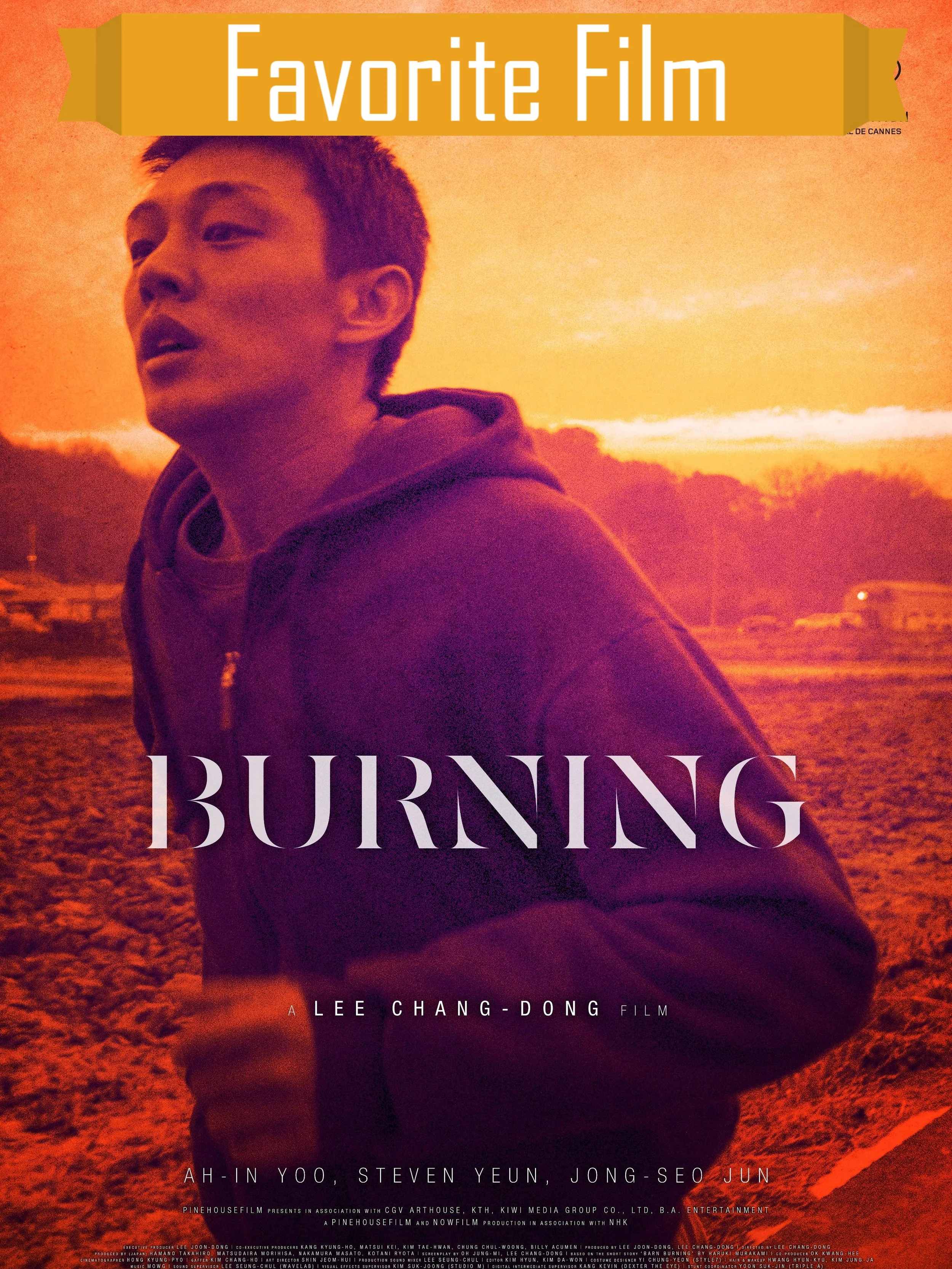Burning (2018)
Director: Lee Chang Dong
Writers: Lee Chang Dong, Oh Jungmi, Haruki Murakami
Actors: Ah-in Yoo, Steven Yeun, Jong-seo Jun
Lee Chang Dong is without a doubt one of my favorite directors of all time. Not just living directors, I’m talking about all time. Aside from Green Fish (which is obviously not a passion project of his), every single movie of his is made to perfection. I cannot stress how incredibly talented this man is. So when I heard that he is coming out with a new movie in 2018, I was so excited. I couldn’t contain myself. Last year we got Phantom Thread from the incredible Paul Thomas Anderson, another one of my favorite directors, and now this. Unfortunately, where I live, Burning was never shown in theaters. I had to wait so long until it was released. Although it is the end of the year, I am happy that I managed to watch it before the year ended. Because it would have been an utter crime if I did my year end list without watching Lee Chang Dong’s film. What I did not expect was watching my favorite film of the year. That’s how good this film is.
Watching this film was such a roller coaster. It started out so simple. Jongsu is a lower class farm boy who meets a girl (Haemi) from his hometown as he is delivering supplies. They have a couple of drinks and get close. Haemi tells Jongsu that she saved up for a trip to Africa and needs someone to watch over her cat who is never shown at her apartment. She comes back from the trip with a mysterious rich man named Ben. He peaks Jongsu’s curiosity and he is interested in what he does. What follows was a series of events that left my jaw on the floor. The film when taken at face value seems simplistic. However, the more I think about it, the more complicated it gets. I keep reliving certain moments. Every single word said in this movie adds another layer of complexity. I was floored by the amount of detail that went into this film. My feelings during the film were exactly the same feelings I had when I saw Mulholland Drive by David Lynch. That film as well, seemed simple at first, then it kept getting more and more complicated as you tried to analyze and understand what was going on. In my mind Burning is on the same level as Mulholland Drive. It is a film that I think will be remembered many years down the line, and one that should be appreciated.
So lets get down to the actual analysis of this film (heavy spoilers obviously). Because I can’t talk about this film without going through all the subtle elements that add to this complex story. I think when you analyze this film, there are two ways you can go about it. Either Jongsu was right about Ben, or he was wrong. As in, either Ben really is a serial killer, or he isn’t. I think because the film is shot mostly in the perspective of Jongsu, many would initially lean more towards Ben being a killer. However, the more I thought about it, the more I think that Jongsu was wrong. That is not saying my interpretation is the correct one, you can easily argue for both cases and you would have enough evidence to back it up. That is why this film is so incredibly well crafted. Anyway, I digress. I think that Lee Chang Dong puts us in the correct frame of mind early on when Jongsu and Haemi are having their first drink together. The film is like the Pantomime scene that Haemi was acting out. She says it best “don’t imagine that the orange is here, but forget that the orange is not here”. That is exactly what this film is trying to do, to us as the audience and to Jongsu. We don’t imagine that Haemi’s cat is there, but we forget that it not there. It is strange to wrap your head around but I think that Lee Chang Dong made a clear decision to have that Pantomime scene at the beginning to bring us into that frame of mind.
Anyway, let’s move on to Ben and what I think he represents. The film as a whole talks about class divide. It is clear in the imagery and the way the characters interact. Jongsu and Haemi are low class citizens. Jongsu sees Haemi’s tiny apartment and is amazed at how nice it is because the bathroom and kitchen sink aren’t close together like his was. Whereas Ben represents the upper class. He lives in this incredibly fancy apartment and drives a Porsche even though he is very young. This why I think Ben isn’t a serial killer. When he talked about burning greenhouses as a hobby, he uses the word 비닐하우스. Thankfully I studied in Korea, so I caught this word. 비닐 literally translates to “plastic” and 하우스 is just the phonetic way of saying “house” in English. When he says he enjoys burning green houses, he doesn’t mean it literally. He is talking about lower class women. Especially ones that feel the need to undergo plastic surgery to up their status in society. This is evident from the beginning of the film when Haemi clearly tells Jongsu that she had plastic surgery done. I feel like his hobby is that he puts “green houses”, as in lower class women, in severe debt. He shows them this lavish lifestyle, and persuades them to take in more than they can handle (traveling, going to expensive outings… etc.). You notice that the second woman to come after Haemi talks alot about China, as if she just traveled to it similar to what Haemi did when she was with Ben’s friends. He even explains how Korean police don’t care about green houses, and that they should be wiped out. That is Ben’s plan, his desire. To stay above the rest, to not allow those women to forcefully infiltrate his class. It all fits in my mind. The fact that Haemi was gone for months and no one cared. No missing persons report was sent, not even her family cared. They even explicitly talk about her credit card debt. We don’t know whether or not this debt happened after Ben or before. Eitherway, the film never tells us anything. We don’t know whether or not that cat from Ben’s apartment is Boil or not. We never see Ben actually kill someone or do as I suspect he did. It is all up to interpretation, and Lee Chang Dong crafted this film with enough clues to allow us to freely analyze and come to our own conclusions. Even as I am writing this now, I am thinking of more things that fit into my theory and that help aide it. The complexity of this film is incredible, and it warrants a second viewing. I have no idea what I will discover if I watch it again.
I am wary to call this film a masterpiece. But I will do it anyway. This film is an absolute masterpiece. So much complexity and thought went into this film. Not only that, Lee tackled a genre which he has never done before, a thriller. Even when he tries something new he perfects it and crafts it so well as if he has been doing for years. This is a film that needs to be studied, appreciated, and praised. I feel like I have only scratched the surface of this film and I can't wait to delve into it again. Do yourself a favor and watch this film. You owe it to yourself to experience this masterpiece.
9.8/10
Favorite Film



